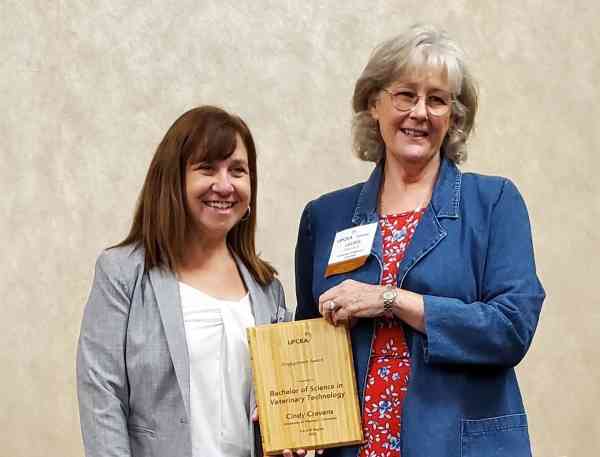
The University of Missouri-Columbia’s (Mizzou) online veterinary technology bachelor’s completion program was recognized with a 2022 Engagement Award from the University of Professional Continuing Education Association (UPCEA). UPCEA’s award honors member institutions that have partners with one or more constituents for a mutual exchange of knowledge and resources in economic or community development, workforce training or capacity building. Read more about the award requirements.
To further advance the veterinary technology profession, Mizzou’s prestigious College of Veterinary Medicine has created over 20 articulation agreement partnerships with colleges nationwide, providing a seamless transfer credit option for students.
The program began last summer as a first-in-the-nation, fully online and asynchronous bachelor’s completion within a college of veterinary medicine. Students must have an associate degree and state credentialing to apply.
“Most vet techs that are out in practice are very limited in their options for transferring to a four-year institution,” Program Director Cindy Cravens, DVM, said. “It was a top priority for us to create a pathway that would allow these students to bring their associate degrees in veterinary technology to Mizzou.”
Watch our video with Cravens speaking about the award and what it means to the veterinary technician community.
To begin a partnership, the College of Veterinary Medicine speaks with interested students and evaluates the curriculum at their transfer institution. Mizzou and the partner organization sign an articulation agreement, which streamlines the path to a bachelor’s completion, saving students time and money on additional earned credits.
Cravens says simplified access helps deliver quality education to more veterinary technicians.
In conjunction with the bachelor’s program development, Mizzou’s College of Veterinary Medicine has also partnered with Moberly Area Community College (MACC) in Moberly, Missouri to offer an associate degree in veterinary technology. MACC provided a letter of support for the program’s Engagement Award nomination.
“We're happy to create agreements with any institution that is interested because our mission is to better serve the veterinary technician community,” Cravens said.
About the program
Most veterinary technology students are already working in a veterinary clinic, taking courses during nights or weekends. Mizzou wanted to provide a flexible online program that allows students to balance multiple responsibilities with continued education.
“We've received a lot of positive feedback about the BSVT program, specifically the fact that it is meant to be flexible for students that are out in practice, working full time, have family responsibilities but are still interested in getting an advanced degree,” Cravens said.
The program exploded in popularity, growing from five to 40 students in its first year.
“If it weren’t for my credits in the past, it’s likely I wouldn't have gone back to school, but being able to use those credits toward the same education for the same degree was very important to me,” said Gary Anderson, Mizzou veterinary technology student.
Anderson was working up to 60 hours per week at a veterinary hospital in Pennsylvania and taking classes on his own time. After working in a clinic for about eight years, he was promoted to head nurse and wanted additional technical skills to better assist his staff. He attended Johnson College of Technology in Scranton, Pennsylvania, where the articulation agreement allowed him to transfer credits to Mizzou.
“Everything I learned before has been a building block from what I’ve learned in my education,” he said. “The knowledge I have for on-hand and technical abilities like blood draws or using an anesthesia machine, I've learned that, and now we’re adding knowledge and intellect backing up those skills with more information as to how those work.”
Johnson College also provided a letter of support for the Engagement Award nomination.
Built for the future
Students can build on existing knowledge to develop skills for advancement, Cravens says.
“Cultivating soft skills such as communication, leadership and ethics that they can bring back to the practice that they're at and potentially move into a leadership position,” she said.
Working in Mizzou’s Vet Health Center sparked Darla Combs’ interest in pursuing a veterinary specialty. She enrolled in a bachelor's program online as a single mom. Like many of her peers, she appreciates the flexibility and asynchronous courses. She studied at Maryville University in St. Louis, which also has an articulation agreement with Mizzou.
“The transition with Maryville was very easy,” she said.
Even when a different school she attended closed, making its credit transfers more challenging, Cindy Cravens helped her find simple solutions.
“There really wasn’t a whole lot of work on my end,” Combs said. “The majority of all my credits transferred because if they hadn't, I would be looking at another 'x amount' of time to earn all the general education credits. It would’ve extended my expected graduation date by quite a bit.”
The bachelor’s completion also provides the continuing education credits students need for a state license.
“Our entire curriculum is RACE certified. So as our students move through the course work, all of the credits will also count for their state licensure requirements,” Cravens said.
The bachelor’s completion in veterinary technology program is open to current and future Mizzou students, military veterans, community college graduates and working professionals seeking additional experience.
Learn more
The University of Missouri-Columbia’s veterinary technology bachelor of science program is intended for veterinary technicians to earn a bachelor’s completion. Building on existing knowledge, the program is ideal for those with a completed associate degree from an AVMA-accredited school and national credentialing. Learn more about the bachelor of science in veterinary technology online program. Visit the College of Veterinary Medicine website. Hear from Program Director, Cindy Cravens on the teaching.missouri.edu blog post.

